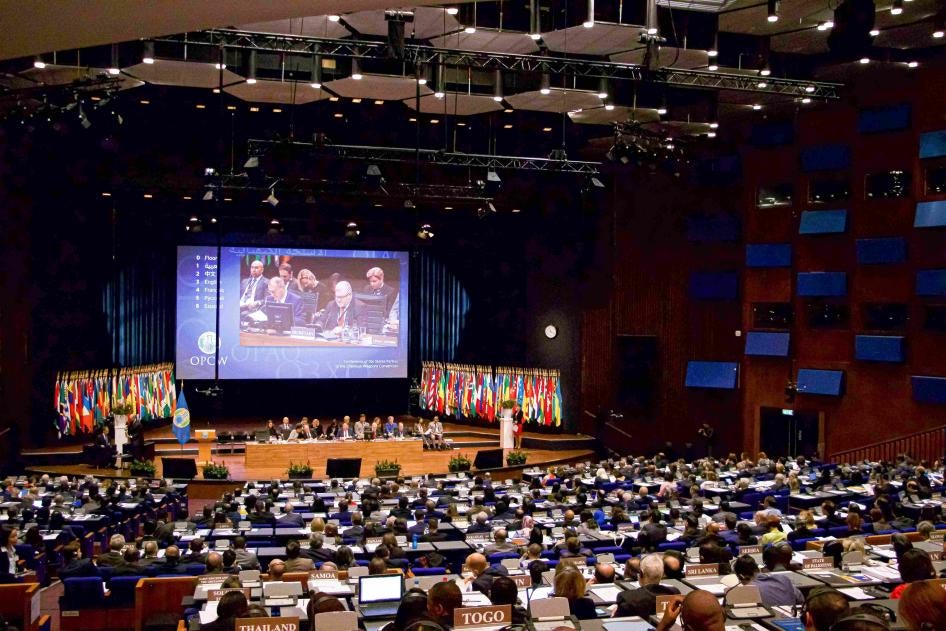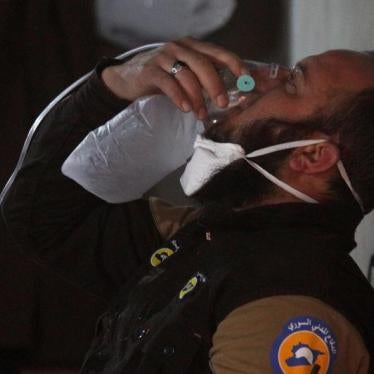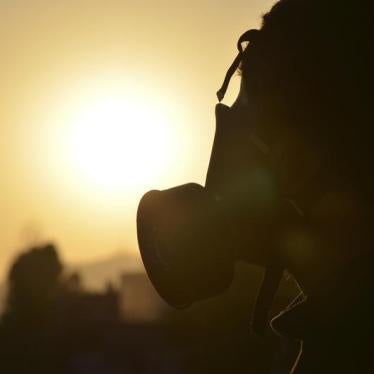(The Hague, May 15, 2023) – Governments should protect the integrity of the international treaty banning chemical weapons by fully carrying out its provisions and by ensuring accountability for any violations, Human Rights Watch said today. A Review Conference of the 1993 Chemical Weapons Convention is scheduled to take place in The Hague on May 15-19, 2023.
“Governments should use the Review Conference to reinforce the longstanding ban against chemical weapons by condemning any use and demanding accountability for violations,” said Mary Wareham, arms advocacy director at Human Rights Watch. “These governments should uphold the integrity of the treaty by publicly singling out violators.”
A total of 193 countries are party to the Chemical Weapons Convention, making it the world’s most universally accepted humanitarian disarmament treaty. Only Egypt, North Korea, and South Sudan remain outside the convention, while Israel has signed but not ratified the treaty.
The landmark convention prohibits the use of the toxic properties of common chemicals such as chlorine to kill or injure. Among other obligations, each member state agrees never to “assist, encourage or induce, in any way, anyone to engage in any activity prohibited to a State Party under this Convention.”
Human Rights Watch conducted extensive research into the use of chemical weapons in Kurdish areas of Iraq in the late 1980s by the government of Saddam Hussein, before the convention took effect internationally in April 1997. More recent research has shown that the Syrian government was responsible for dozens of chemical weapon attacks in the 2010s. Human Rights Watch, the United Nations, and others have also investigated use of chemical weapons by the armed group Islamic State (ISIS) in Syria and Iraq during the past decade.
Upon ratifying the convention in October 2013, Syria committed to abide by the strict prohibition on any development, production, acquisition, stockpiling, retention, transfer, or use of chemical weapons. Yet the Syrian government has only partially complied with the requirement to declare and destroy any remaining stocks of chemical weapons and the facilities that produced them.
Moreover, the Syrian government continued to use chemical weapons after joining the convention. Repeated investigations by the UN and the convention’s Organisation for the Prohibition of Chemical Weapons concluded that Syrian government forces used the nerve agent sarin as well as chlorine delivered by improvised air-dropped bombs between 2015 and 2018 in attacks that reportedly killed or injured thousands of people.
In 2018, states parties to the Chemical Weapons Convention condemned “in the strongest possible terms the use of chemical weapons by anyone under any circumstances.”
Human Rights Watch has frequently documented the often abusive and sometimes lethal use of tear gas and other chemical irritants by law enforcement and other security forces, especially during protests. Law enforcement officials may employ such riot control agents in accordance with international human rights law, which permits its use only when necessary to prevent further physical harm. The use of tear gas should be preceded, when possible, by warnings and it should never be employed to disperse nonviolent protests.
However, under the Chemical Weapons Convention, during international and noninternational armed conflicts, such riot control agents may not be used as a method of warfare. Governments need to be vigilant in preventing and suppressing any use of tear gas on the battlefield, Human Rights Watch said.
Requests from Human Rights Watch to participate in meetings of the Chemical Weapons Convention were denied in the past due to objections by a few member countries, but in April Human Rights Watch’s accreditation to attend the Fifth Review Conference was accepted. According to the Organisation for the Prohibition of Chemical Weapons, nearly all of Review Conference accreditation requests from nongovernmental organizations were accepted. A handful were rejected, including those from the Syrian Network for Human Rights, Syria Civil Defence, and the Middle East Treaty Organization.
“A couple of governments should not be able to mute expert civil society voices by denying them access to important meetings of the Chemical Weapons Convention,” Wareham said. “The convention urgently needs to overhaul its practices for accepting or rejecting the presence of nongovernmental organizations and to make the decisions clear and public.”









